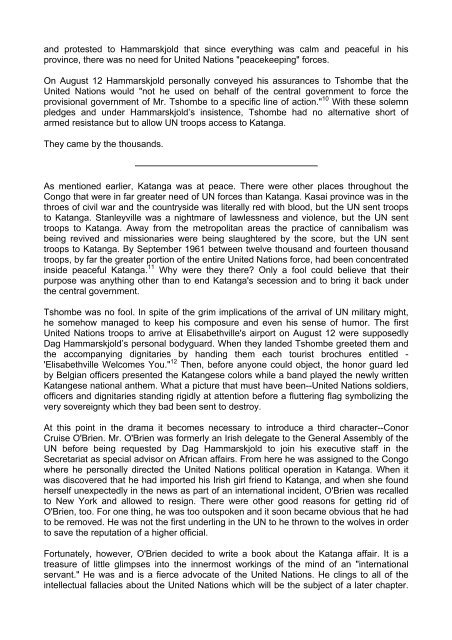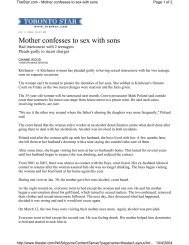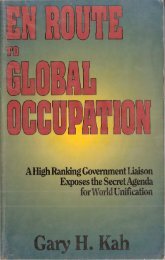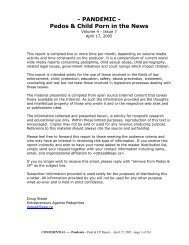G. Edward Griffin - The Fearful Master - PDF Archive
G. Edward Griffin - The Fearful Master - PDF Archive
G. Edward Griffin - The Fearful Master - PDF Archive
You also want an ePaper? Increase the reach of your titles
YUMPU automatically turns print PDFs into web optimized ePapers that Google loves.
and protested to Hammarskjold that since everything was calm and peaceful in his<br />
province, there was no need for United Nations "peacekeeping" forces.<br />
On August 12 Hammarskjold personally conveyed his assurances to Tshombe that the<br />
United Nations would "not he used on behalf of the central government to force the<br />
provisional government of Mr. Tshombe to a specific line of action." 10 With these solemn<br />
pledges and under Hammarskjold’s insistence, Tshombe had no alternative short of<br />
armed resistance but to allow UN troops access to Katanga.<br />
<strong>The</strong>y came by the thousands.<br />
As mentioned earlier, Katanga was at peace. <strong>The</strong>re were other places throughout the<br />
Congo that were in far greater need of UN forces than Katanga. Kasai province was in the<br />
throes of civil war and the countryside was literally red with blood, but the UN sent troops<br />
to Katanga. Stanleyville was a nightmare of lawlessness and violence, but the UN sent<br />
troops to Katanga. Away from the metropolitan areas the practice of cannibalism was<br />
being revived and missionaries were being slaughtered by the score, but the UN sent<br />
troops to Katanga. By September 1961 between twelve thousand and fourteen thousand<br />
troops, by far the greater portion of the entire United Nations force, had been concentrated<br />
inside peaceful Katanga. 11 Why were they there? Only a fool could believe that their<br />
purpose was anything other than to end Katanga's secession and to bring it back under<br />
the central government.<br />
Tshombe was no fool. In spite of the grim implications of the arrival of UN military might,<br />
he somehow managed to keep his composure and even his sense of humor. <strong>The</strong> first<br />
United Nations troops to arrive at Elisabethville's airport on August 12 were supposedly<br />
Dag Hammarskjold’s personal bodyguard. When they landed Tshombe greeted them and<br />
the accompanying dignitaries by handing them each tourist brochures entitled -<br />
'Elisabethville Welcomes You." 12 <strong>The</strong>n, before anyone could object, the honor guard led<br />
by Belgian officers presented the Katangese colors while a band played the newly written<br />
Katangese national anthem. What a picture that must have been--United Nations soldiers,<br />
officers and dignitaries standing rigidly at attention before a fluttering flag symbolizing the<br />
very sovereignty which they bad been sent to destroy.<br />
At this point in the drama it becomes necessary to introduce a third character--Conor<br />
Cruise O'Brien. Mr. O'Brien was formerly an Irish delegate to the General Assembly of the<br />
UN before being requested by Dag Hammarskjold to join his executive staff in the<br />
Secretariat as special advisor on African affairs. From here he was assigned to the Congo<br />
where he personally directed the United Nations political operation in Katanga. When it<br />
was discovered that he had imported his Irish girl friend to Katanga, and when she found<br />
herself unexpectedly in the news as part of an international incident, O'Brien was recalled<br />
to New York and allowed to resign. <strong>The</strong>re were other good reasons for getting rid of<br />
O'Brien, too. For one thing, he was too outspoken and it soon became obvious that he had<br />
to be removed. He was not the first underling in the UN to he thrown to the wolves in order<br />
to save the reputation of a higher official.<br />
Fortunately, however, O'Brien decided to write a book about the Katanga affair. It is a<br />
treasure of little glimpses into the innermost workings of the mind of an "international<br />
servant." He was and is a fierce advocate of the United Nations. He clings to all of the<br />
intellectual fallacies about the United Nations which will be the subject of a later chapter.



![Robert T McQuaid [rtmq@stn.net] Sent: Friday, October 29, 2004 12 ...](https://img.yumpu.com/51070071/1/190x245/robert-t-mcquaid-rtmqstnnet-sent-friday-october-29-2004-12-.jpg?quality=85)







